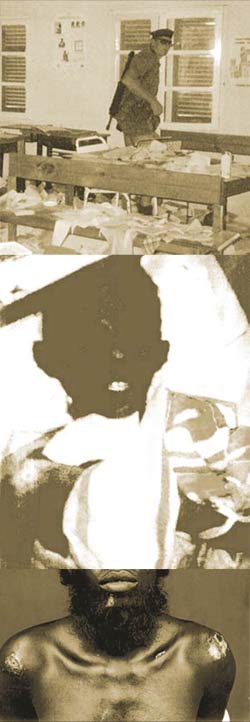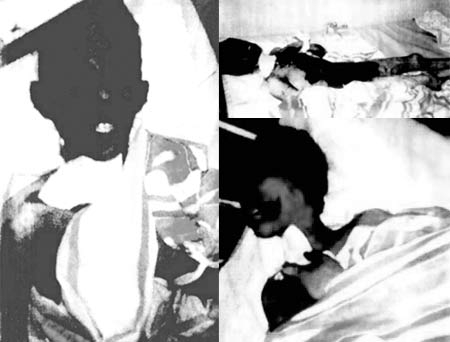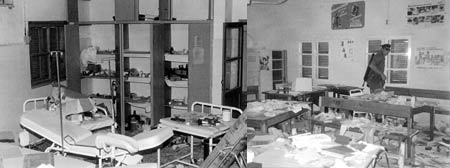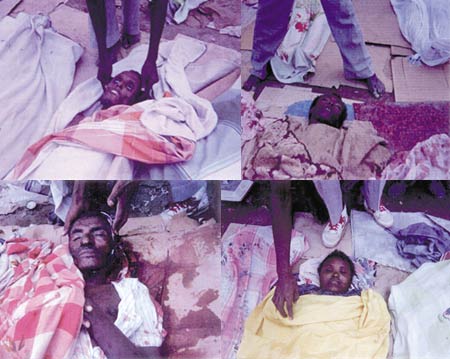Djibouti - Oppression in Africa’s Smallest Country
 |
Djibouti is a small though little-known country lying between Somalia, Ethiopia and Eritrea. Wars and massacres have gone on there for hundreds of years, and the Muslim population have been condemned to conflict from the colonialist period right up to the present day.
Islam came to what is now Djibouti in the seventh and eighth centuries. Until the beginning of the sixteenth century, Muslims were the sole power in the region, which then came under the sphere of influence of Portugal, a major commercial and political power at that time. When Egypt came under Ottoman rule, the Horn of Africa where Djibouti lies also became part of the Ottoman Empire.
The bloody history of Djibouti actually began when the Suez Canal was opened to international maritime traffic and European states began competing to colonize Asian and African countries and dominate them economically, politically, militarily and religiously. As the major powers in the nineteenth century, Great Britain and France engaged in a great race to colonize and expand. Britain entered Aden in 1839 and Somalia in 1869, and was thus able to establish control of the Red Sea trade route. Djibouti acquired considerable importance at this time with its strategic position from the point of view of the Suez Canal. In order to compensate for Britain's advantageous position, France built a wharf on the Djibouti coast. By 1884 it had dominated the whole area by means of agreements and treaties.
 |
The years that followed were dark times for the people of Djibouti. There was a wide difference of opinion on the future of the country among the Muslim population. The Isas of Somali descent felt it should join with the Republic of Somalia. The second major ethnic community, the Afars, supported dependence on France. Between these two views and French encouragement, the fighting grew fiercer. Although the Muslims who supported unification with Somalia were numerically greater, a referendum in the country on March 16, 1967 decided that it should remain a French dependency. However, there was intense conflict after the referendum as a result of French pressure and electoral fraud. French troops then occupied the country, on the pretext of intervening in the bloody incidents between the two ethnic groups in the country; the majority of the natives were killed and hundreds of thousands were exiled. The Ishas were weakened during the operation, and the Afars took over the running of the country.
Djibouti became independent in 1977, with 97 percent of the population voting in favor. It has since become a nation of military coups. Between 1977 and 1991, 2,000 Muslims were subjected to inhumane and humiliating treatment. Amnesty International reports describe terrible forms of torture and degradation inflicted on people in Djibouti. Some 7,000 people were arrested for no reason and tortured by forces of the state.43
 |
| A Djiboutian woman who was first raped, then tortured, and then burned alive by having gasoline poured over her. (http://www.liberte-aref.com/francais/tortu.htm) |
 |
 |
| From 1991 to the present, Djibouti National Army security forces have carried out large attacks in the north of the country. Not content with just torturing people, they have also burned schools and medical dispensaries, destroying all stocks of medical supplies. They attacked water supplies, committed rape, and set about to commit total genocide. These pictures show the situation after attacks in 1992. |
The Djibouti Regime's Method of Torture |
 |
| In addition to years of internal conflict, the people of Djibouti have also been subjected to torture. One of these is known as the "Poste." The method was first employed in the Lac Assal deportation camp in 1993, and victims were placed facedown and their arms stretched out. They were then hung upside down, their faces level with a hole in the ground, although their faces did not touch the ground. Two stones were then placed on their shoulders, so that their shoulders were taking on their whole weight. As a result of this torture, people would be unable to lift their arms. This method of torture is employed by the army against opponents of the regime. The victim in the photograph is just one of the thousands of Djiboutians who have been subjected to that horrible form of torture |
Some 3,500 French troops are still based in Djibouti, which remains under French economic and military domination.44 Djibouti has no national army of its own and has bowed its head to the French military presence. France has been responsible for internal security for many years since the nominal establishment of independence. There are also many French advisors and officials in the administration. The government is at the edge of bankruptcy, kept on its feet only by the support of European states.
In addition to this longstanding colonial rule, Djibouti now faces very real poverty. Droughts have led to the losses of large numbers of livestock, and many people have perished from malnutrition.
- Foreword
- Introduction - A Call To All People of Conscience ...
- Danger Facing The Islamic World - The Anti-Islamic Alliance Facing Muslims
- Chechnya - Oppression as The Whole World Watches
- Kashmir - The Muslims of Kashmir are Waiting for Help
- East Turkestan - Savagery hidden by the communist Chinese Government
- Bosnia, Kosovo and Macedonia - The peoples of the Balkans dragged from one war to Another
- Algeria - The Bloody Toll of Endless Cruelty and Oppression
- Tunisia - A People Oppressed Solely for Their Faith
- Eritrea and Ethiopia - Muslims Want Peace and Security
- Chad - The Muslim country the colonialist French administration tried to destroy
- Somalia - A Poor Nation in the Midst of Civil Wars
- Djibouti - Oppression in Africa’s Smallest Country
- Sudan - A Country Trying To Escape Fighting and Civil War
- Uzbekistan - Former Communists Continue To Oppress Muslims
- Afghanistan - Endless Civil Wars Due To Communist Savagery
- Iraq - Middle East Fascism: Saddam Hussein
- Syria - The History of Terrible Oppression Hidden from The World
- The Oppression of Muslim Minorities - Muslims Trying To Live By Their Religion
- Conclusion

